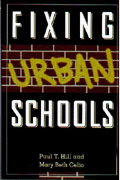Every year, in one out of three big cities, the school superintendent leaves his or her job, sending local community leaders back to square one. Cleveland, Baltimore, and Washington, D.C., are struggling to recreate their failed school systems, and many more cities are likely to follow. City leaders need more than new superintendents. They need stable reform strategies strong enough to move an entrenched system. Unfortunately, it is not clear where they can turn for help. Education experts are deeply divided about whether teacher retraining or new standards are enough to reform a struggling city system, or whether more fundamental changes, such as family choice and family-run schools, are needed. Based on new research, this book identifies the essential elements of reform strategies that can transform school performance in big cities beset by poverty, social instability, racial isolation, and labor unrest. It also suggests ways that local leaders can assemble the necessary funding and political support to make such strategies work.
Authors
Paul T. Hill is coauthor (with Christing Campbell and James Harvey) of It Takes a City (Brookings, 2000). He is a nonresident senior fellow at the Brookings Institution and a research professor at the University of Washington's Daniel J. Evans School of Public Affairs. Mary Beth Celio is a statistical consultant to the University of Washington's Center on Re-Inventing Public Education. She is also the demographer for the Catholic Archdiocese of Seattle.


